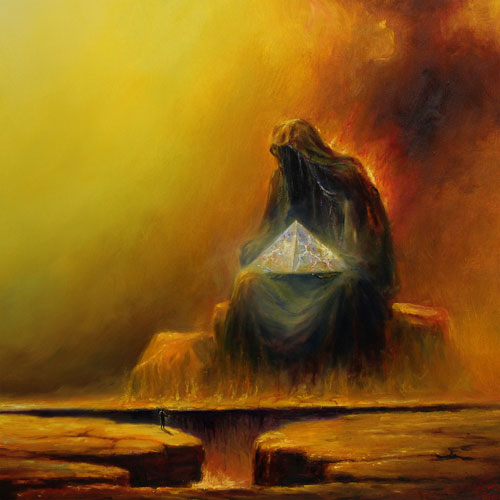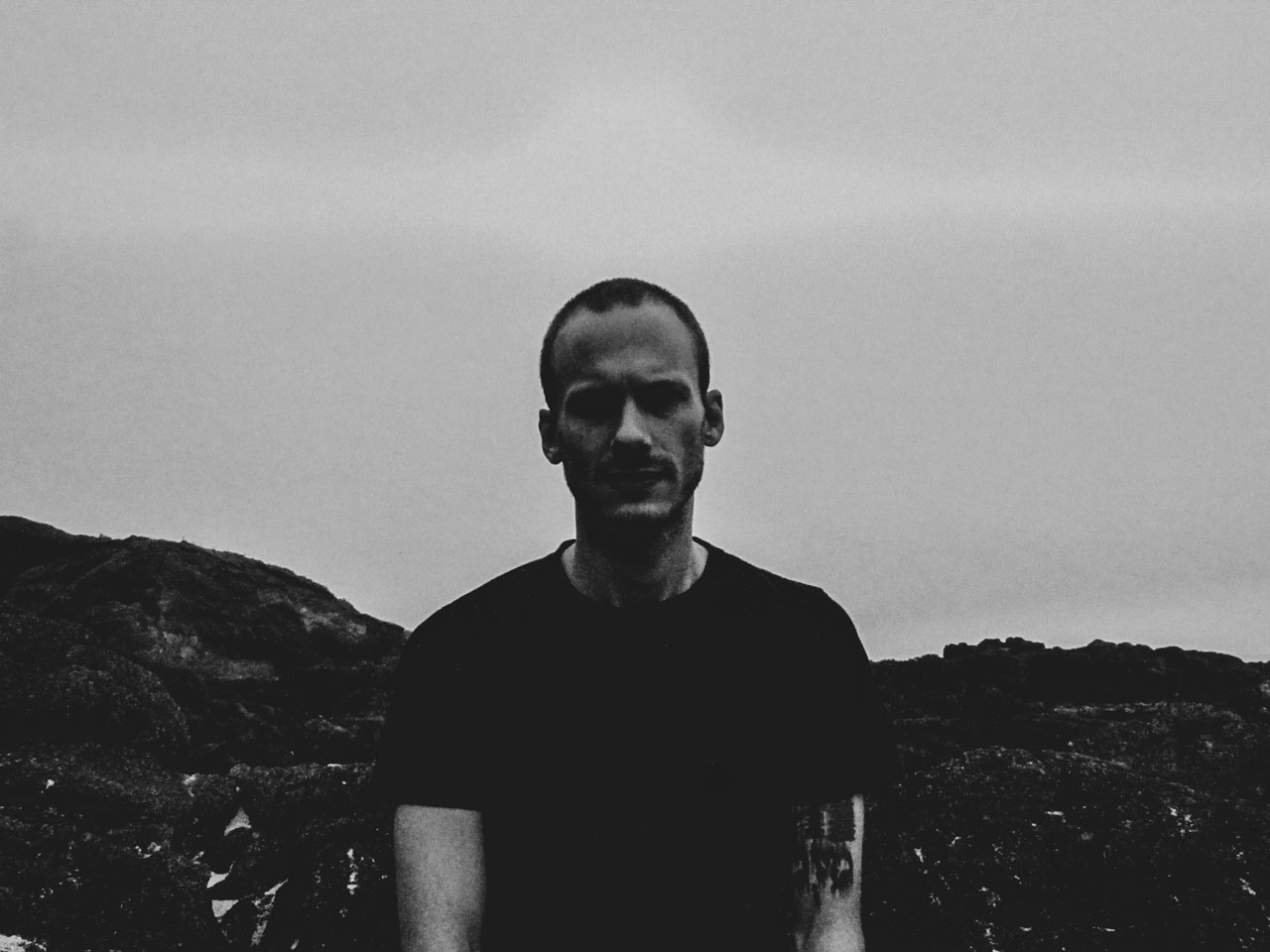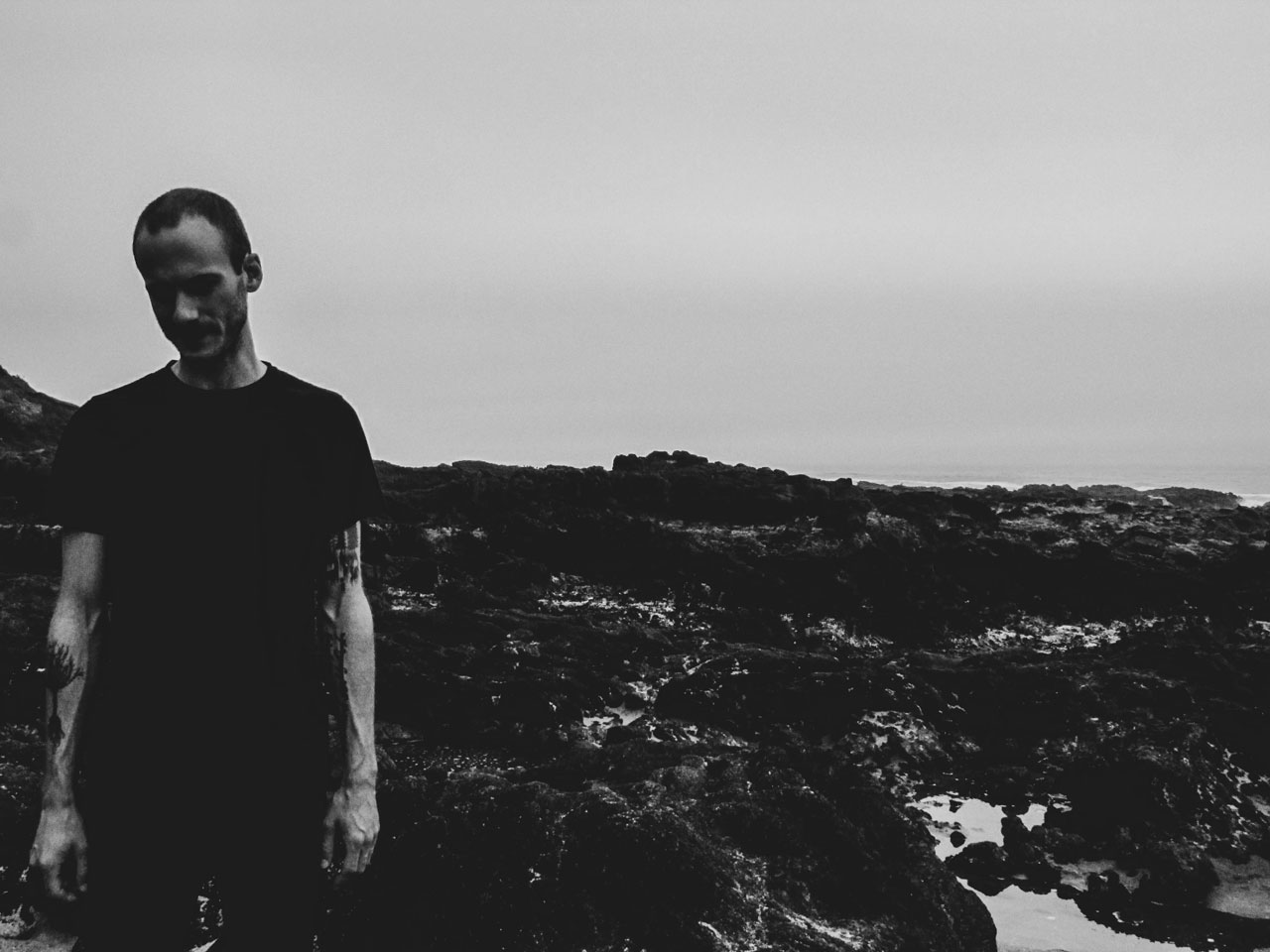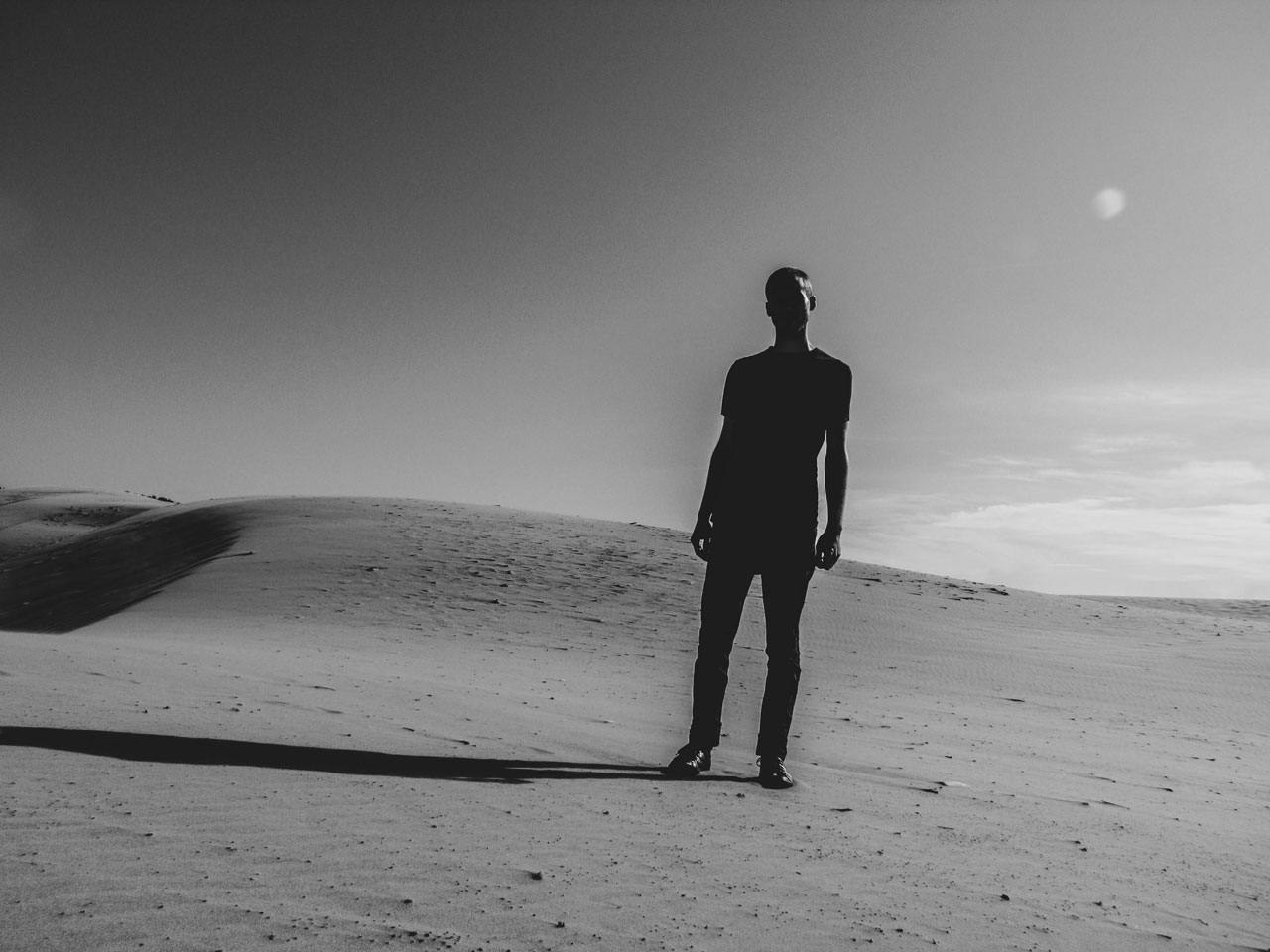Emma Ruth Rundle in conversation with black metal outfit Mizmor
Emma Ruth Rundle and A.L.N. – the man behind black metal act Mizmor – took a hike to discuss life, religion and art, while picking apart Mizmor's new album one lyric at a time
Part 3 - Cairn lyrics unpacked

1. Desert Of Absurdity
2. Cairn To God
3. Cairn To Suicide
4. The Narrowing Way
E.R.R.: So let’s bring it back to Mizmor and talk about the title of the album: Cairn. Can you state what that is, for people that don’t know, and how that works with this album?
A.L.N.: A cairn is a stack of rocks, most simply put, used as a marker, often as a memorial, and it’s a very old way of doing that. It can be a grave site, or can be a marker that doesn’t have to do with death, but it is a way that humans set up little monuments.
The idea that I’m appropriating by using that as the title, to relate back to Myth of Sisyphus and Camus, is navigational. The first song is called Desert Of Absurdity and that’s the setting for the album, the landscape for the album, and there’s this symbolic parallel where we have these ideas of god and suicide, that I’m ruling out.
I’m anti-god and I’m anti-suicide, I’ve figured out that there’s no worth in those things, and I wish to erect a giant monument or memorial to those ideas to act as a guidepost for myself so that I can move forward in my life and understanding without retracing my steps.
I think a lot, I circular think a lot, and I’m constantly riddled with doubts and concerns. This has been a marker of my personality for a long time and it became especially bad in my Christianity.
For a while, post-Christianity, I had a temptation to circle back and reevaluate that and question it again and it’s like, ‘wait what… why did I come up with this conclusion again?’
There could be a number of things, whether I was practicing my faith and it was, ‘what’s the answer to that contradiction in the Bible?’ or whether it’s post-faith wondering, ‘what do I think about divinity?’ or just whatever - having solid answers to those questions so you don’t waste time revisiting the same questions ‘cause that’s just my personality type. It’s an anxiety thing.
Sign up below to get the latest from Metal Hammer, plus exclusive special offers, direct to your inbox!
E.R.R.: So there’s a finality to it.
A.L.N.: Yeah, you’re really setting up these monuments, memorials, guideposts, to remind yourself. You’re way off in the distance, you think you’re going the right way, and then all of sudden you’re tempted like, ‘maybe I should kill myself… maybe I should believe in god.’ You look in the distance…
E.R.R.: I’ve been here before.
A.L.N.: Yeah, I’ve been here before, there’s nothing for it. In my mind they’re gigantic cairns that could not be built by one person, they’re surreal in that way, but you’re in a desert, it’s vast and you need to be able to see from far away, so in my mind these are fucking huge stacks of rocks.
It’s gotta be huge if it marks the death of god. But that is the album title in a nutshell. And I think the album itself to me is one of those. Kind of has this deeper level to it, the existence of that record to me is my own personal cairn.

E.R.R.: I think the album format is really useful to the artist in that way on their own path, in reflecting onto certain eras or times and that makes total sense. And so, into Desert of Absurdity. Is that a specific reference to Camus?
A.L.N.: That is a Camus reference, yep. At one point, he paints the picture of the individual in the desert. It really struck me ‘cause that’s just exactly what it feels like. I had so many moments that were like, ‘he’s taking the words out of my mouth.’
And that’s exactly what it feels like. I feel like I’m wandering around in this heat stricken place, totally disoriented, seeing mirages. And as I explained, Desert Of Absurdity is the song in which the premise is laid out, the setting is laid out, where we explore the fact that life is absurd because of man’s search for meaning and the fact that there’s no ultimate meaning.
The first line of the song is, “lucidity has found me, awareness is mine.” Which is also a huge part about this record - clarity, being known, expressing that things can be known, and seeking to want to be known myself with this idea; and it is a missional idea in that way.
At first I was really uncomfortable with my loss of faith and expressing that to people but now I know that people all over the world can relate to this and I feel much more confident and strongly about my stance now that I do not believe in god and I’m not embarrassed about that.
And I am all for the folks out there - Dawkins, Harris, Krauss - there’s a whole movement of folks that are talking really explicitly, specifically, scientifically, educationally about an atheistic worldview, even touring around, book tours and doing talks and whatnot, and I think that’s really inspiring and cool.
I want folks to know how I feel about this. I think that god should be dismantled and I want to be a part of that.
E.R.R.: Right and you’re being very clear in your statement regarding that. And when you say, “Beams reflect…” What does that mean?
A.L.N.: Often with my music I don’t know where to start stuff, and so I feel like the beginning of a song is like coming-to in consciousness, so then I just kind of mindfully describe the surroundings.
And so this is still in the beginning of the song, describing how it feels to be in the desert of absurdity, which is life, and, “beams reflect rallying burden,” is this idea that it feels like the sun’s rays are just unbearable, and in my confusion and disorientation, it has a magnifying effect.
Maybe it reflects off the sand and into your eye or is just burning your skin, but the heat increases the burden that you already have of existential dread and confusion trying to find your way, and it just is trying to impress upon how inhospitable the circumstances and setting and heat, as it were, are.
E.R.R.: And waking into this reality of meaninglessness and godlessness. “…a world devoid of purpose and truth. Thus awakes the absurd, its dissonance engulfs me.” In the first song it feels like you’re, like you said, suddenly there, you’re transported into this place…
A.L.N.: And you feel the cognitive dissonance that is searching for meaning and being confronted, really accepting the fact that there is none. And I mean, it’s not comfortable if you’re really honest and in tune. It’s natural too. But there’s definitely a dissonance and sometimes it’s really powerful.
E.R.R.: And a dessert is often thought of as a very hostile environment.
A.L.N.: Yeah, it’s hard to remain there.
E.R.R.: Yeah that’s not naturally a life giving setting.
A.L.N.: But I think in the desert, god and suicide are very much mirages of oases. The desert is all that’s actually there. But you will see and be attracted to certain routes of escape.
E.R.R.: And you can walk forever…
A.L.N.: And you can walk forever.
E.R.R.: And your thirst could never be quenched.
A.L.N.: Absolutely, dude. Absolutely.

E.R.R.: So then, in Cairn to God you say, “I recall my path, clearly I see…” Again clarity is a theme on the album.
A.L.N.: Yeah, “Cairn to God,” is probably as close to hearkening back to old Mizmor lyrics as we’re gonna get here. Talking about mourning loss of faith in god and how that was explored for the past seven years. I guess the coming-to that we’re talking about… I’m remembering that I’ve tried this idea before, that I found it to be false and that I can maybe even see the cairn off in the distance. Maybe I already built that cairn at the time that our enter-scene is happening at the beginning of “Desert of Absurdity,” and it’s like, ‘wait ok I remember, I know how I got here.’
E.R.R.: OK so, The Narrowing Way, - when you listen to it and read the lyrics we’re like revising what the album is in a way, and it’s the third option, it’s the path that lies between the two others, the deciding to continue and what that means.
Listening and reading the lyrics, “I sat at the table of suicide, was served the ashen bread,” it calls to mind the body of Christ. And sitting at the table, I think of the last supper. “Starvation spread on silver platter I decided on hunger instead.” Can you just tell me a little bit about the song?
A.L.N.: You’ve described it pretty well. Intrinsically, a desert is whatever shape, kind of formless when you’re down in it, it’s just vast. But in my mind I pictured one cairn on one side of me and one cairn on the other, a left and right thing, so it was like I went and visited this idea over here and then went this way and was stopped, and you kind of bounce back and forth and as you go forward it becomes more and more a sharp angle until its just a straight line, almost asymptotically. And this is where I see myself now.
E.R.R.: You’ve ascribed the meaning to your life.
A.L.N.: Yeah. If you’re not going to remain at either place where you’ve built the cairns, you want to keep living, keep walking. I mean, you will just keep walking, you will go forward, but I think that’s a hard thing to do, I think it’s hard to get past both of the cairns and figure out how to move forward.
So when I say, “sat at the table of suicide, was served the ashen bread, starvation spread on silver platter, I decided on hunger instead,” I had this idea that there is a temptation in suicide of the end of pain and the end of hardship and maybe even a temptation of comfort or safety.
And that is being symbolized here by bread being served to you; the analogy being hunger, this discomfort that you’re feeling that you want to end, thinking, ‘oh great what a bounty I will eat,’ and then when it enters your mouth it’s just ash and doesn’t actually…
E.R.R.: There’s no sustenance there.
A.L.N.: There’s no sustenance there. And it’s rich with religious symbolism. I mean, I’m kind of practically drawing a line between religion and suicide, they’re both escapes to me. But to decide on hunger I think really encapsulates what it means to continue living pretty well because life is just full of pain.
E.R.R.: And that’s the “toilsome trek?”
A.L.N.: Yeah, and I’m saying that I would rather go on feeling hungry than eat something that isn’t food, that is actually starving and killing me, to remain thirsty rather than quenching my thirst with the lie of god.
I just think that is what it is to be alive. We have hunger, we have pain, it’s just part of life. It propels our survival and struggle and thus our evolution, and it’s not a thing to escape from. I mean, it certainly is, because people escape from it all the time, but in my opinion it shouldn’t be a thing to escape from.

E.R.R.: And that’s “remaining on that dizzying crest?”
A.L.N.: Yeah. Remaining on the dizzying crest is choosing to live in the absurdity every single day. And then some of my favorite lines, “daily revolt, the breath in my lungs.”
Absurdity is revolting in a sense and both of these ideas of god and suicide are revolting and to feel the sensation of really undergoing and allowing those ideas to seep to your core, it then spurs you on to live your life in the present, in the now, in reality, believing truth and not falsehood.
There is a certain kind of rebellion to that because it is very tempting to believe in magic or to just stop living sometimes.. So I think there is kind of a certain rebellion to continue on living this painful life that we live in clear awareness, knowing how it is and that it’s not going to stop. You know?
If we decide not to stop it, it’s not gonna stop. So using that to kind of empower yourself. I like this language, also Camus inspired, of the dizzying crest because it makes me picture the top of a dune that’s been blown by the wind so it’s got that sharp little spine down it; it’s like you’re fuckin’ bombarded constantly on both sides of this voice saying this thing and that voice saying the other and it’s really hard to actually remain on the path of life knowing that it’s ultimately meaningless.
And it is like balancing and rebelling. So there’s great difficulty in taking the narrowing way, that is not to be taken for granted, and you can stop at any point, certainly.
E.R.R.: At any time, yeah. And I wonder how in the future, in your future as an artist and as a person, that will shape up for you.
A.L.N.: Yeah, I could end up changing my opinion on both these things.
E.R.R.: I feel like the most hopeful section of the entire album lyrically is in the very last bit, in this last section of lines.
A.L.N.: That is true. I don’t know if I can really say much about it short of just reading it ‘cause I think it kind of speaks for itself. But there are these lines in italics that preface each song that actually aren’t in the lyrics and I think that that should be read with the last stanza here.
Referring to life, it says, “its vise obliges me to make, harnessing its energy to give the void its colors. There is not Truth but truths, meaning is self imposed and life implores me to ascribe or else be trampled underneath. The vulnerable universe strikes a human chord - resound, relate, create.”
That’s my ultimate thesis, my ultimate answer to this. It’s like, ‘ok we’ve ruled out those things, we are on the narrowing way, we are continuing to live, like so what? Why? First of all. And like, what do we do, are we just gonna feel suicidal all the time but just decide to keep living, like what the fuck is this life thing even supposed to be?’
And for me I’ve decided that there is not an ultimate meaning to life but it is certainly enriched if you can find things that have meaning to you. I don’t think that meaning doesn’t exist I just don’t think there is meaning with a capital M. And I mean, yeah we all feel the void, I know you feel the void, and I think art, creating, and relating your experience helps bring color into life and makes things beautiful.
A lot of times life looks totally grey and I think there’s a danger to not identifying things that are meaningful to you in moments when you want to end your life. So I think that if you don’t do the work to figure out why you’re alive, why you’re saying no to suicide, what you care about in this life, that you might lose your life, either metaphorically or literally.
And the way that I’m doing that is with my relationships with loved ones and with my music. I think that to be human in this universe means to be vulnerable, that’s like a huge human quality, our emotions and our intelligence and that interplay. And I think that if we can be honest about that and resonate our experience, whether it’s good or bad, just be as human as possible in that sense, as open as possible… for me I’m creating art and music to keep myself alive.
And I am resonating, like an instrument does, my experience of vulnerability and pain and beauty and relating that to others who talk to me about surviving religion and how this music helps them and we have life-giving conversations and it spurs me on to keep creating.
It’s just one thing but a big thing that’s defining the purpose of my life right now because it seems to be also helping others with the purpose of their lives that have had similar traumatic religious experiences and that has been truly powerful to learn about. That has changed the project and what I want people to know about the project. And I dunno… yeah that’s it I guess.
E.R.R.: Hell yeah it’s an awesome album. [High fives].
A.L.N.: Thanks dude.
Mizmor's new record Cairn is out September 6 via Gilead Media and available on LP, CD and Digital from here.
Current page: PT. 3 - Cairn lyrics unpacked
Prev Page PT 2. - E.R.R. on her upbringing, religion, art, and life